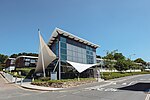Woolwell
Bickleigh, South HamsSuburbs of Plymouth, Devon

Woolwell is a suburb on the north-east fringe of the city of Plymouth, England, located just outside the city's boundaries in the district of the South Hams. It is situated along the A386, close to the boundary of Dartmoor National Park, with good views of the surrounding landscape. Housing development began in Woolwell in 1981 and there is now a population of slightly over 3000. For an area of its size, it has a large number of facilities, including its own primary school, a medical centre and several shops.
Excerpt from the Wikipedia article Woolwell (License: CC BY-SA 3.0, Authors, Images).Woolwell
Thistle Close, South Hams Woolwell
Geographical coordinates (GPS) Address Nearby Places Show on map
Geographical coordinates (GPS)
| Latitude | Longitude |
|---|---|
| N 50.43 ° | E -4.1 ° |
Address
Thistle Close
PL6 7TG South Hams, Woolwell
England, United Kingdom
Open on Google Maps





